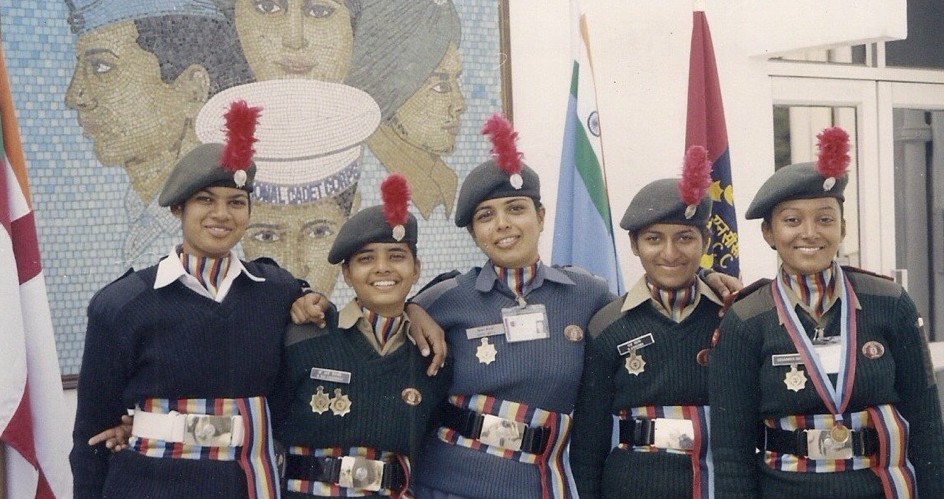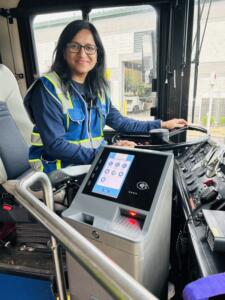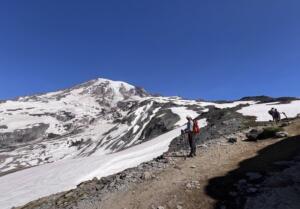Vandana Sudini is Genfare’s Senior Manager of Programs and Implementations, overseeing transit system deployments for Genfare customers nationwide. Her team of 12 professionals ensures that fare collection solutions are delivered on time, within scope, and are aligned with customer and business goals.
Vandana’s also got a unique backstory, with a strong sense of discipline honed during her time with the Indian Air Force youth wing. Keep reading this Genfare employee spotlight to find out why she gets up at 4 a.m. on weekends, how she hires team members that customers love, and why meditation time means a trip to the shooting range.
Did you use public transportation as a child in India?
My father was in the Indian Army, so I lived all over the country growing up. Public transportation is huge in India, so I’m very familiar with it.
How did the youth wing of the Indian Armed Forces shape your life?
I was in the National Cadet Corps (NCC), in the Air Force wing of the Indian Armed Forces, for three years. We lived away from home, learned to fly light planes, and were certified in shooting, parasailing, and paragliding. With daily competitions, you had to be physically, mentally, and emotionally strong to get through it. My friends from that time, about 15 girls, still meet up.
We hear you earned some prestigious distinctions!
I was a shooter, and I was among those chosen to represent the state at Delhi, the capital of India, on Republic Day, our national celebration.

Tell us about your path to Genfare team.
I came from a technology background, and I learned transit. I have an MBA degree, and before Genfare I got experience as a senior QA manager and business analyst, and then in implementations, working with PwC consulting. When I joined Genfare in 2016, I started out leading the QA team.
How does that experience help your customers today?
Back then, the QA team was responsible for not just testing, but also implementations and product management. So I had complete knowledge of our products, whether it was our hardware, software, or mobile apps, how they function, and how they work together. I can lead implementations so well because I wrote the original scripts, plans, and procedures. I can convert our solutions to the unique needs of each transit agency and clarify different possibilities and options that enhance the customer experience.
 How did you transition into programs and implementations?
How did you transition into programs and implementations?
When our president, Eric Kaled, came on board, he was shifting Genfare to a full-solution software provider as well as a hardware company. He moved me into program management, where I became a leader.
Your team has a great reputation amongst agency customers. What’s the secret?
We’re a transformation team. We understand the problems agencies need to solve and the best ways to implement the solutions. That’s how we can help agencies navigate the fare collection modernization process and make the transition from age-old systems to the smart systems we implement right now.
What qualities do you look for when hiring your team members?
We look for someone who understands transit. They have to be able to speak and understand technology. But they don’t need to be a developer. We have business analysts, technology enthusiasts, and a former IT director who understands the changing roles in transit and how to build systems that meet these needs.
What’s your hiring philosophy?
I would say I’ve been lucky to have found them! Our team includes people with decades of experience working for transit systems in major U.S. cities. Mike Haynes worked with the Chicago Transit Authority (CTA). Jeff Hanft worked for New York City Transit (MTA) and has a transit-related education as well. Lou Cantu worked with CTA for 30-plus years and Hector Serrano worked with the Greater Richmond Transit Company in Virginia for 20-plus years. Kiran Chaudhari worked for Metra Commuter Rail for over 6 years.
What’s your role on the team?
Project management is like an art and everyone has their style of doing work. We create tools or procedures, set priorities, let the program managers know the plan and how the revenue system works. Then I give them their space and plug in wherever I can when we have multiple projects going on.
You say knowledge sharing is key to serving customers. How so?
Internally, I conduct product training, and other Genfare program managers conduct transit-related training. This knowledge-sharing within the team has helped us to conduct deep discussions with our transit customers.
How does offering a full suite of software solutions change what you do?
Our team’s personal interactions with agencies have increased. We don’t solely rely on engineering for implementations; fortunately, our team has a lot of hands-on experience to bring to the table.
What do you like about working alongside tech innovators?
The industry is evolving, and at Genfare, there has been a total technology-led change, with so many enhancements happening. I really enjoy working with the engineering team when new products are developed. It changes every day and I’ve always been curious to learn new things. For example, I use AI very often right now, even though it has nothing to do with my job responsibilities. I have also done certifications for cloud platforms, so that if somebody is talking about how cloud technologies work, I can wrap my head around it.
How does your team provide hands-on product management support?
We leverage our good relationships with the customers to help bridge the gap between the industry and its changing requirements and the engineering team. We support the whole team through field trials and the pilots, making sure we get enough feedback from the customers. It benefits everyone involved.
What has been your proudest moment as a Genfare colleague?
Working on projects keeps me closer to implementation and procedures if anything needs to be updated. One personal achievement is open payment, where riders can use a credit card on the bus directly. I tested it and wrote the whole procedure, and we implemented it within three weeks.
How does open payment help reduce the cost of cash collection?
We recently implemented open payment in Orlando, and they’ve now reduced their cash collection by one-third. They have thousands of transactions a day with tourists going to places like Disneyland, so it is saving them time and money. Processing cash being collected can cost agencies more than their actual revenue.
What do you enjoy about the people in the transit industry?
Public transit people take pride in making a difference in the lives of the riders. And that feels good.
How have you seen this play out?
I can never forget the senior revenue officer of Palm Tran in Palm Beach County, Florida, explaining to me exactly why the fare capping solution we were implementing for them would be so important for daily wage customers. Those customers cannot spend $60 to get a monthly pass at once. With fare capping, you are giving them an opportunity to pay as they go, without going over the amount of a monthly pass. That tells us how much he pays attention to the riders, and how every day he comes to the office and he tries to make a difference in people’s lives.
You work with agencies of all sizes, across departments. What’s that like?
I have learned something new from every leader of our transit agency partners, whether they are a big agency with hundreds of buses or a small one with 10 buses. I also speak with C-suite leaders, highly technical teams, maintenance garage managers, and others. I enjoy working with all of them and adjusting my style to suit the different needs and personalities.
What are agency customers most excited about after an upgrade?
When we implement these smart solutions, agencies love the ease of usability, the increased convenience for riders and visibility of their usage data as well. Their riders have more options. They can just go on their mobile app, buy a ticket from home or at a coffee shop, and then use it on the bus. You don’t have to go to a the bus station to buy a ticket or a monthly pass or a seven-day pass. This also reduces the stress on agency customer service at busy times.


You live in Dallas. Tell us a bit about your family!
My husband, Amar and I have two kids, a daughter, Adhira, 13, who plays volleyball on the 13-and-under U.S.A. team, and a son, Vrishaan, who is 7. Amar is a director of transformations at a fintech company.
In addition to your family, what do you do to relax?
I was a national shooter in India, and I continue to go for practice in the close range. People don’t believe me, but that’s my “yoga” focus. I’ve also started hiking recently and it’s become my thing. I’ve hiked Mount Rainier near Seattle, Washington. It’s so beautiful and serene. I’m planning to go to a new hiking place every month and hopefully someday I’m going to go for the summit height. Maybe Everest Base Camp! I’ve got to start training for that.
Do you hike near home, too?
There are no mountains here at home, but every day at 4 or 5 a.m. I trail walk about six miles. On the weekends I go about 12 miles. I drag along a friend, and we start at 4:30 a.m. and are done by noon.
Did that discipline come from your Dad, who served in the Indian Army?
He was very disciplined himself, but he was very chill with us. The discipline came from being in the youth wing of the Indian Air Force. You had to wake up every day at 4 o’clock, take your rifle and get on with it.